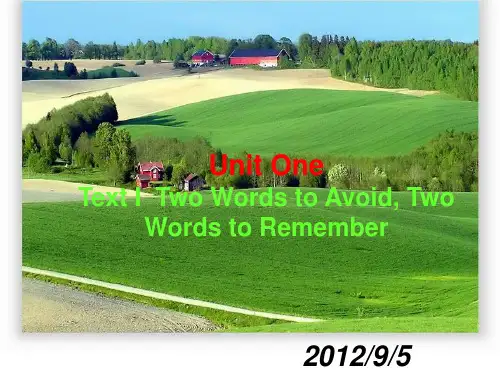新编英语教程第六册
- 格式:ppt
- 大小:1.66 MB
- 文档页数:70
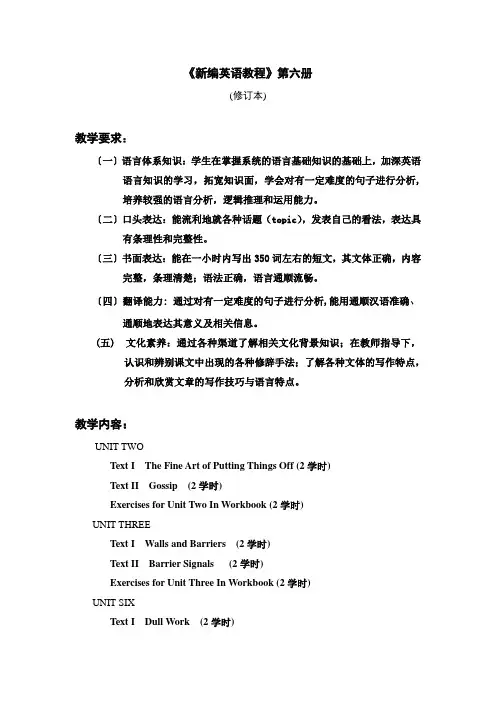
《新编英语教程》第六册(修订本)教学要求:〔一〕语言体系知识:学生在掌握系统的语言基础知识的基础上,加深英语语言知识的学习,拓宽知识面,学会对有一定难度的句子进行分析,培养较强的语言分析,逻辑推理和运用能力。
〔二〕口头表达:能流利地就各种话题(topic),发表自己的看法,表达具有条理性和完整性。
〔三〕书面表达:能在一小时内写出350词左右的短文,其文体正确,内容完整,条理清楚;语法正确,语言通顺流畅。
〔四〕翻译能力: 通过对有一定难度的句子进行分析,能用通顺汉语准确、通顺地表达其意义及相关信息。
(五) 文化素养:通过各种渠道了解相关文化背景知识;在教师指导下,认识和辨别课文中出现的各种修辞手法;了解各种文体的写作特点,分析和欣赏文章的写作技巧与语言特点。
教学内容:UNIT TWOText I The Fine Art of Putting Things Off (2学时)Text II Gossip (2学时)Exercises for Unit Two In Workbook (2学时)UNIT THREEText I Walls and Barriers (2学时)Text II Barrier Signals (2学时)Exercises for Unit Three In Workbook (2学时)UNIT SIXText I Dull Work (2学时)Text II Doing Chores (2学时)Exercises for Unit Six In Workbook (2学时)UNIT SEVENText I Beauty (2学时)Text II Sexism in English: A Feminist View (2学时)Exercises for Unit Seven In Workbook (2学时)UNIT EIGHTText I Appetite (2学时)Text II Wanting an Orange (2学时)Exercises for Unit Eight In Workbook (2学时)UNIT NINEText I A Red Light for Scofflaws (2学时)Text II Trust (2学时)Exercises for Unit Nine In Workbook (2学时)UNIT TENText I Straight-A Illiteracy (2学时)Text II The Qualities of Good Writing (2学时)Exercises for Unit Ten In Workbook (2学时)UNIT ELEVENText I On Consigning Manuscripts to floppy Discs and Archives to Oblivion (2学时)Text II This Is Progress? (2学时)Exercises for Unit Eleven In Workbook (2学时)UNIT TWELVEText I Grand and Lee: A Study in Contrasts (2学时) Text II Grand and Lee (2学时)Exercises for Unit Twelve In Workbook (2学时)UNIT THIRTEENText I Euphemism (2学时)Text II Clutter (2学时)Exercises for Unit Thirteen In Workbook (2学时) UNIT FOURTEENText I That Astounding Creator --- Nature (2学时) Text II When the Young Have It Good (2学时) Exercises for Unit Fourteen In Workbook (2学时) UNIT FIFTEENText I Teaching as Mountaineering (2学时)Text II A Liberal Education (2学时)Exercises for Unit Fifteen In Workbook (2学时)。
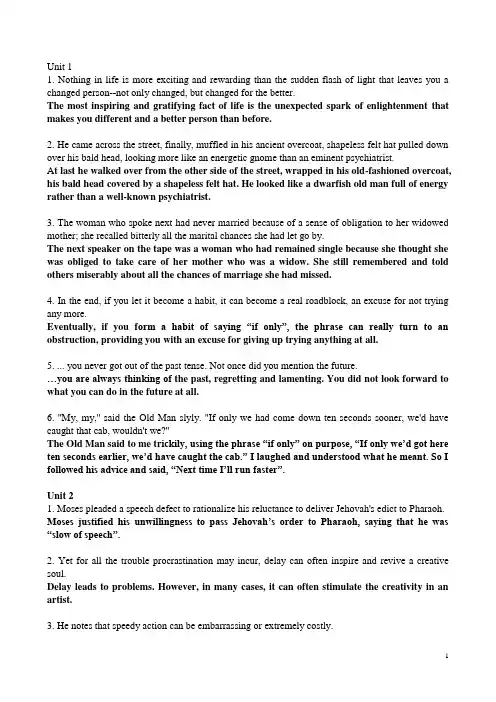
Unit 11. Nothing in life is more exciting and rewarding than the sudden flash of light that leaves you a changed person--not only changed, but changed for the better.The most inspiring and gratifying fact of life is the unexpected spark of enlightenment that makes you different and a better person than before.2. He came across the street, finally, muffled in his ancient overcoat, shapeless felt hat pulled down over his bald head, looking more like an energetic gnome than an eminent psychiatrist.A t last he walked over from the other side of the street, wrapped in his old-fashioned overcoat, his bald head covered by a shapeless felt hat. He looked like a dwarfish old man full of energy rather than a well-known psychiatrist.3. The woman who spoke next had never married because of a sense of obligation to her widowed mother; she recalled bitterly all the marital chances she had let go by.The next speaker on the tape was a woman who had remained single because she thought she was obliged to take care of her mother who was a widow. She still remembered and told others miserably about all the chances of marriage she had missed.4. In the end, if you let it become a habit, it can become a real roadblock, an excuse for not trying any more.Eventually, if you f orm a habit of saying “if only”, the phrase can really turn to an obstruction, providing you with an excuse for giving up trying anything at all.5. ... you never got out of the past tense. Not once did you mention the future.…you are always thinking of the past, regretting and lamenting. You did not look forward to what you can do in the future at all.6. ''My, my,'' said the Old Man slyly. ''If only we had come down ten seconds sooner, we'd have caught that cab, wouldn't we?''The Old Man said to me tr ickily, using the phrase “if only” on purpose, “If only we’d got here ten seconds earlier, we’d have caught the cab.” I laughed and understood what he meant. So I followed his advice and said, “Next time I’ll run faster”.Unit 21. Moses pleaded a speech defect to rationalize his reluctance to deliver Jehovah's edict to Pharaoh. Moses justified his unwillingness to pass Jehovah’s order to Pharaoh, saying that he was “slow of speech”.2. Yet for all the trouble procrastination may incur, delay can often inspire and revive a creative soul.Delay leads to problems. However, in many cases, it can often stimulate the creativity in an artist.3. He notes that speedy action can be embarrassing or extremely costly.He points out that hastiness may give rise to decision which turn out to be humiliating or expensive.4. Bureaucratization, which flourished amid the growing burdens of government and the greater complexity of society, was designed to smother policymakers in blankets of legalism, compromise and reappraisal---and thereby prevent hasty decisions from being made.Excessive red-tape(官样文章;繁文缛节) developed because public administration was expanding in scope and because society was growing more and more complicated. In this sense, red-tape helped those in charge of policy to be fully engaged in enormous amount of paperwork and judgment, thus making it impossible for an immature decision to result.5. ...many of my friends go through agonies when they face a blank page.…many of my friends have a hard time the moment they attempt to put pen to paper.Unit 31. Of course, my father is a gentleman of the old school, a member of the generation to whom a good deal of modern architecture is unnerving; but I suspect---I more than suspect, I am convinced---that his negative response was not so much to the architecture as to a violation of his concept of the nature of money.Brought up in the old tradition, my father is naturally not prepared to accept the idea of modern architecture; his objection to it, I would assume, indeed I should say I am pretty sure, is not a result of his strong dislike of the physical building itself, but rather that of his refusal to change his attitude towards money.2. If a building's design made it appear impregnable, the institution was necessarily sound, and the meaning of the heavy wall as an architectural symbol dwelt in the prevailing attitude toward money, rather than in any aesthetic theory.If a building was made to look sturdy/invulnerable, it would be accordingly regarded as reliable, and the significance of the thick walls would be measured not by their artistic value, but by their seeming ability to provide a safe location for money.3. In a primitive society, for example, men pictured the world as large, fearsome, hostile, and beyond human control.P eople in a primitive society, for example, saw the world as an enormous planet full of fear, hatred and disorder.4.The principal function of today's wall is to separate possible undesirable outside air from the controlled conditions of temperature and humidity which we have created inside.Today a wall serves mainly as a physical means to protect the desired atmosphere inside from being disturbed by anything unwelcome outside.5. To repeat, it is not our advanced technology, but our changing conceptions of ourselves in relation to the world that determine how we shall build our walls.Again, the decisive factor that can influence the design of a wall is not the advancement of science and technology, but our ever-changing attitude towards our place in this world.Unit 41. He was a man of exuberant fancy, and, withal, of an authority so irresistible that, at his will, he turned his varied fancies into facts.He was a man rich in whimsies, and intolerant of any act bold enough as to challenge his authority. When his mind caught upon something, absurd as it might be, he would do everything to make sure that it was done in the way he wished.2. When every member of his domestic and political systems moved smoothly in its appointed course, his nature was bland and genial; but whenever there was a little hitch, and some of his orbs got out of their orbits, he was blander and more genial still, for nothing pleased him so much as to make the crooked straight, and crush down uneven places.When all his subjects behaved in such a manner as they were told to, he could be gentle and kind. And he could even be more so, if anything not conforming to what he expected should occur, because that offered a great chance for him to see the undesirable removed, a thing he was most delighted in doing.3. He could open either door he pleased: he was subject to no guidance or influence but that of the aforementioned impartial and incorruptible chance.He enjoyed total freedom to choose what to do: he was not directed or influenced by anyone as to which door to open. The only thing that was decisive in terms of his fate was the above-mentioned chance, granted to all the accused alike.4. This element of uncertainty lent an interest to the occasion which it could not otherwise have attained.The fact that no one could tell for sure what might happen (to the accused) made this from of trial more attractive than any other form of justice.5. Thus the masses were entertained and pleased, and the thinking part of the community could bring no charge of unfairness against this plan; for did not the accused person have the whole matter in his own hands?Thus people enjoyed coming here to watch, and those guided by reason in the society could not possibly question the fairness of this form of trial; for was it not the fact that all the accused were given equal chances to make decisions upon their won destiny?Unit51. This semi-barbaric king had a daughter as blooming as his most florid fancies, and with a soul as fervent and imperious as his own.This semi-barbaric king had a daughter as exuberant as the wildest of his notions, a daughter who possessed a nature as fierce and tyrannical as his own.2. Of course, everybody knew that the deed with which the accused was charged had been done.It was, of course, known to all that he was guilty of the offense of conducting an affair with the princess.3. ...; but the king would not think of allowing any fact of this kind to interfere with the workings of the tribunal, in which he took such great delight and satisfaction.…,even though the ki ng was well aware that the love affair had taken place, he would still refuse to let the normal method of deciding guilt or innocence be disturbed, because he was extremely enthusiastic about his way of setting matters of this kind.4. ...; but gold, and the power of a woman's will, had brought the secret to the princess..…; but because she had the money, and above all, because her determination was so irresistible, the princess was able to get access to the secret.5. He understood her nature, and his soul was assured that she would never rest until she had made plain to herself this thing, hidden to all other lookers-on, even to the king.He knew her so well that he was perfectly positive that she would never cease to search for the secret, which remained unknown to all other spectators, even to the king himself.Unit 61. There seems to be a general assumption that brilliant people cannot stand routine; that they needa varied, exciting life in order to do their best.It is generally believed that a colorless life can freeze a creative mind, and that only a colorful life can inspire a man to creative work.2. The outstanding characteristic of man's creativeness is the ability to transmute trivial impulses into momentous consequences.One of the wonders human creativity works is that man can make full use of even insignificant feelings to produce far-reaching results.3. An eventful life exhausts rather than stimulates.A life full of diversions stops man’s creativity instead of activating it.4. It is usually the mediocre poets, writers, etc.,who go in search of stimulating events to release their creative flow.Only literary artists of an average type rely on excitements in life as a source for their creative work./ Great poets, writers, etc., create works of art out of trivial and common subject.5. People who find dull job unendurable are often dull people who do not know what to do with themselves when at leisure.People who are unable to see how to be patient with repetitious work are usually those who are unable to see where to find fun in life when it comes to relaxation.。
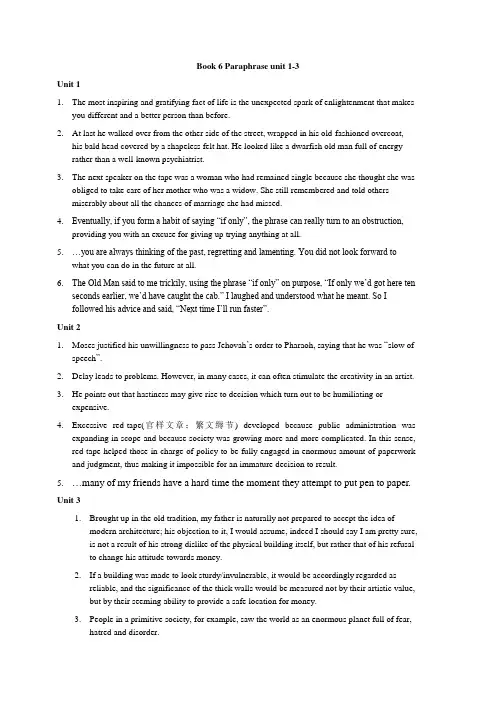
Book 6 Paraphrase unit 1-3Unit 11.The most inspiring and gratifying fact of life is the unexpected spark of enlightenment that makesyou different and a better person than before.2.At last he walked over from the other side of the street, wrapped in his old-fashioned overcoat,his bald head covered by a shapeless felt hat. He looked like a dwarfish old man full of energy rather than a well-known psychiatrist.3.The next speaker on the tape was a woman who had remained single because she thought she wasobliged to take care of her mother who was a widow. She still remembered and told othersmiserably about all the chances of marriage she had missed.4.Eventually, if you form a habit of saying “if only”, the phrase can really turn to an obstruction,providing you with an excuse for giving up trying anything at all.5.…you are always thinking of the past, regretting and lamenting. You did not look forward towhat you can do in the future at all.6.The Old Man said to me trickily, using the phrase “if only” on purpose, “If only we’d got here tenseconds earlier, we’d have caught the cab.” I laughed and understood what he meant. So Ifollowed his advice and said, “Next time I’ll run faster”.Unit 21.Moses justified his unwillingness to pass Jehovah’s order to Pharaoh, saying that he was “slow ofspeech”.2.Delay leads to problems. However, in many cases, it can often stimulate the creativity in an artist.3.He points out that hastiness may give rise to decision which turn out to be humiliating orexpensive.4.Excessive red-tape(官样文章;繁文缛节) developed because public administration wasexpanding in scope and because society was growing more and more complicated. In this sense, red-tape helped those in charge of policy to be fully engaged in enormous amount of paperwork and judgment, thus making it impossible for an immature decision to result.5.…many of my friends have a hard time the moment they attempt to put pen to paper. Unit 31.Brought up in the old tradition, my father is naturally not prepared to accept the idea ofmodern architecture; his objection to it, I would assume, indeed I should say I am pretty sure, is not a result of his strong dislike of the physical building itself, but rather that of his refusal to change his attitude towards money.2.If a building was made to look sturdy/invulnerable, it would be accordingly regarded asreliable, and the significance of the thick walls would be measured not by their artistic value, but by their seeming ability to provide a safe location for money.3.People in a primitive society, for example, saw the world as an enormous planet full of fear,hatred and disorder.4.Today a wall serves mainly as a physical means to protect the desired atmosphere insidefrom being disturbed by anything unwelcome outside.Again, the decisive factor that can influence the design of a wall is not the advancement of science and technology, but our ever-changing attitude towards our place in this world.。
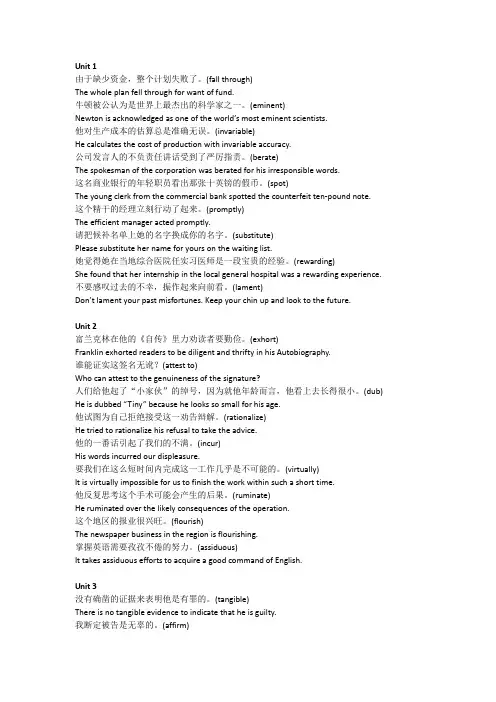
Unit 1由于缺少资金,整个计划失败了。
(fall through)The whole plan fell through for want of fund.牛顿被公认为是世界上最杰出的科学家之一。
(eminent)Newton is acknowledged as one of the world’s most eminent scientists.他对生产成本的估算总是准确无误。
(invariable)He calculates the cost of production with invariable accuracy.公司发言人的不负责任讲话受到了严厉指责。
(berate)The spokesman of the corporation was berated for his irresponsible words.这名商业银行的年轻职员看出那张十英镑的假币。
(spot)The young clerk from the commercial bank spotted the counterfeit ten-pound note.这个精干的经理立刻行动了起来。
(promptly)The efficient manager acted promptly.请把候补名单上她的名字换成你的名字。
(substitute)Please substitute her name for yours on the waiting list.她觉得她在当地综合医院任实习医师是一段宝贵的经验。
(rewarding)She found that her internship in the local general hospital was a rewarding experience. 不要感叹过去的不幸,振作起来向前看。
(lament)Don’t lament your past misfortunes. Keep your chin up and look to the future.Unit 2富兰克林在他的《自传》里力劝读者要勤俭。


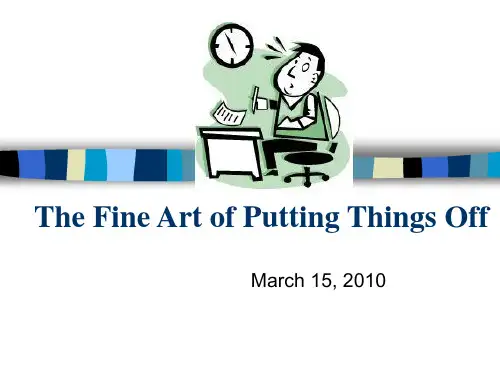

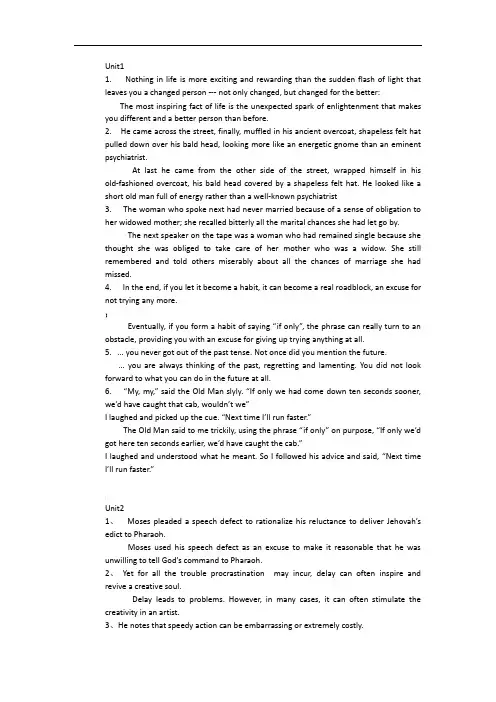
Unit11. Nothing in life is more exciting and rewarding than the sudden flash of light that leaves you a changed person --- not only changed, but changed for the better: The most inspiring fact of life is the unexpected spark of enlightenment that makes you different and a better person than before.2. He came across the street, finally, muffled in his ancient overcoat, shapeless felt hat pulled down over his bald head, looking more like an energetic gnome than an eminent psychiatrist.At last he came from the other side of the street, wrapped himself in his old-fashioned overcoat, his bald head covered by a shapeless felt hat. He looked like a short old man full of energy rather than a well-known psychiatrist3.The woman who spoke next had never married because of a sense of obligation to her widowed mother; she recalled bitterly all the marital chances she had let go by.The next speaker on the tape was a woman who had remained single because she thought she was obliged to take care of her mother who was a widow. She still remembered and told others miserably about all the chances of marriage she had missed.4.In the end, if you let it become a habit, it can become a real roadblock, an excuse for not trying any more.】Eventually, if you form a habit of saying “if only”, the phrase can really turn to an obstacle, providing you with an excuse for giving up trying anything at all.5.… you never got out of the past tense. Not once did you mention the future.… you are always thinking of the past, regretting and lamenting. You did not look forward to what you can do in the future at all.6.“My, my,” said the Old Man slyly. “If only we had come down ten seconds sooner, we’d have caught that cab, wouldn’t we”I laughed and picked up the cue. “Next time I’ll run faster.”The Old Man said to me trickily, using the phrase “if only” on purpose, “If only we’d got here ten seconds earlier, we’d have caught the cab.”I laughed and understood what he meant. So I followed his advice and said, “Next time I’ll run faster.”.Unit21、Moses pleaded a speech defect to rationalize his reluctance to deliver Jehovah’s edict to Pharaoh.Moses used his speech defect as an excuse to make it reasonable that he was unwilling to tell God’s command to Pharaoh.2、Yet for all the trouble procrastination may incur, delay can often inspire and revive a creative soul.Delay leads to problems. However, in many cases, it can often stimulate the creativity in an artist.3、He notes that speedy action can be embarrassing or extremely costly.He points out that hastiness may give rise to decisions which turn out to be humiliating or expensive.4、Bureaucratization, which flourished amid the growing burdens of government and the greater complexity of society, was designed to smother policymakers in blankets of legalism, compromise and reappraisal ---- and thereby prevent hasty decisions from being made.[Excessive red-tape developed because public administration was expanding in scope and because society was growing more and more complicated. In this sense, red-tape helped those in charge of policy to be fully engaged in an enormous amount of paperwork and judgment, thus making it impossible for an immature decision to make.5.…many of my friends go through agonies when they face a blank page.…many of my friends have a hard time the moment they attempt to put pen to paper.Unit3.1.Of course, my father is a gentleman of the old school, a member of the generation to whom a good deal of modern architecture is unnerving; but I suspect ---- I more than suspect, I am convinced ---- that his negative response was not so much to the architecture as to a violation of his concept of the nature of moneyBrought in the old tradition, my father is naturally not to accept the idea of modern architecture; his objection to it, I would assume, indeed I am sure that is not a result of his strong dislike of the physical form of the building, but his refusal to change his attitude towards money.2.If a building’s design made it appear impregnable, the institution was necessarily sound, and the meaning of the heavy wall as an architectural symbol dwelt in the prevailing attitude toward money, rather than in any aesthetic theory.(If a building was made to look invulnerable, it would be regarded as reliable, and the significance of the thick walls would be measured not by their artistic value, but by their attitude towards money3.In a primitive society, for example, men pictured the world as large, fearsome, hostile, and beyond human control.People in a primitive society, for example, saw the world as an enormous planet full of fear, hatred and disorder.4.The principal function of today’s wall is to separate possible undesirable outside air from the controlled conditions of temperature and humidity which we have created inside.Today a wall serves mainly as a physical means to protect the desired atmosphere inside from being disturbed by anything unwelcome outside.5.To repeat, it is not our advanced technology, but our changing conceptions of ourselves in relation to the world that determine how we shall build our walls.Again, the decisive factor that can influence the design of a wall is not the advancement of science and technology, but our ever-changing attitude towards our place in this world;Unit41.He was a man of exuberant fancy, and, withal, of an authority so irresistible that, at his will, he turned his varied fancies into facts.He was a man rich in the fancies, and intolerant of any act bold enough as to challenge his authority. When his mind caught upon something, he would do everything to make sure that it was done in the way he wished.2.When every member of his domestic and political systems moved smoothly in its appointed course, his nature was bland and genial; but whenever there was a little hitch, and some of his orbs got out of their orbits, he was blander and more genial still, for nothing pleased him so much as to make the crooked straight, and crush down uneven places.When all his subjects behaved in such a manner as they were told to, he could be gentle and kind. And he could even be more so, if anything not conforming to what he expected should occur, because that offered a great chance for him to see the undesired removed, which he was most delighted in.3.He could open either door he pleased: he was subject to no guidance or influence but that of the aforementioned impartial and incorruptible chance. He enjoyed total freedom to choose what to do: he was not directed or influenced by anyone as to which door to open. The only thing that was decisive in terms of his fate was the above-mentioned chance, granted to all the accused alike.4.This element of uncertainty lent an interest to the occasion which it could not otherwise have attained.The fact that no one could tell for sure what might happen (to the accused) made this form of trial more attractive than any other form of justice.】5.Thus the masses were entertained and pleased, and the thinking part of the community could bring no charge of unfairness against this plan; for did not the accused person have the whole matter in his own handsThus people enjoyed coming here to watch, and those sensible people could not possibly question the fairness of this form of trial; for was it not the fact that all the accused were given equal chances to make decisions upon their own destinyUnit51. This semi-barbaric king had a daughter as blooming as his most florid fancies, and witha soul as fervent and imperious as his own.This semi-barbaric king had a daughter as exuberant as the wildest of his notions,a daughter who possessed a nature as fierce and tyrannical as his own2.Of course, everybody knew that the deed with which the accused was charged and had been done.It was, of course, known to all, that he was guilty of the offense of conducting an affair with the princess.;3.…but the king would not think of allowing an y fact of this kind to interfere with the workings of the tribunal, in which he took such great delight and satisfaction.…even though the king was well aware that the love affair had taken place, he would still refuse to let the normal method of deciding guilt or innocent be disturbed, because he was extremely enthusiastic about his way of settling matters of this kind.4. but gold, and the power of a woman’s will, had brought the secret to the princess.but because she had the money, and above all, because her determination was irresistible, the princess was able to get across the secret.5. He understood her nature, and his soul was assured that she would never rest until she had made plain to herself this thing, hidden to all other lookers-on, even to the king.He knew her so well that he was perfectly positive that she would never cease to search for the secret, which remained unknown to all other spectators, even to the king himself.Unit6¥1.There seems to be a general assumption that brilliant people cannot stand routine; that they need a varied, exciting life in order to do their best.It is generally believed that a colorless life can freeze a creative mind, and that onlya colorful life can inspire a man to creative work.2. The outstanding characteristic of man’s creativeness is the ability to transmute trivial impulses into momentous consequences.One of the wonders human creativity works is that man can make full use of even significant feelings to produce far-searching results.3.An eventful life exhausts rather than stimulates.A life full of diversions stops man’s creativity instead of activating it.4.It is usually the mediocre poets, writers, etc., who go in search of stimulating events to release their creative flow.Only literary artists of an average type rely on excitements in life as a source for their creative work.{5.People who find dull jobs unendurable are often dull people who do not know what to do with themselves when at leisure.People who are unable to see how to be patient with repetitious work are usually those who are unable to see where to find fun in life when it comes to relaxation.Unit71. One of Socrates’ main pedagogical acts was to be ugly and teach those innocent, no doubt splendid-looking disciples of his how full of paradoxes life really was.The contrast between Socrates’ outward ugliness and his inner strengths served to tell his naïve and handsome followers the fact that there were many such strange contrasts in the world.2.We not only split off---- with the greatest facility ---- the “inside”(character, intellect) from the “outside”(looks); but we are actually surprised when someone who is beautifulis also intelligent, talented, good.We tend to resist the idea that inside beauty (character, intellect) can coexist with outside beauty (looks) in one single person, but in fact we are surprised to meet one who is beautiful both inside and outside.~3.Associating beauty with women has put beauty even further on the defensive, morally.Connecting beauty with women has put beauty in a position which is subject to criticism concerning moral principles.4.If a woman does real work ---- and even if she has clambered up to a leading position in politics, law, medicine, business, or whatever ---- she is always under pressure to confess that she still works at being attractive.However successful a woman may be in her career as a politician, lawyer, doctor, businesswoman, or whatever, she unavoidably feels compelled to admit to making an effort to look attractive.5.One could hardly ask for more important evidence of the dangers of considering persons as split between what is “inside” and what is “outside” than that inte rminable half-comic half-tragic tale, the oppression of women.The biased attitude towards women ---- the long story of which is both lamentable and laughable ---- is the most powerful proof as to how harmful it can be to judge a person by refusing to put into consideration both inner beauty and outer beauty together.Unit8【1. Besides, the whole toffeeness of toffees was imperceptibly diminished by the gross act of having eaten it.Apart from that, the entire attraction of the toffee is gone once the toffee is eaten.2. So, for me, one of the keenest pleasures of appetite remains in the wanting, not the satisfaction.As far as I am concerned, the greatest pleasure appetite can offer is the longing for what I have yet to achieve rather than to feel content with what I have already achieved.is why I would carry the preservation of appetite to the extent of deliberate fasting, simply because I think that appetite is too good to lose, too precious to be bludgeoned into insensibility by satiation and overdoing itMy intentional denial of food might be explained by the urge to keep the desire for food constantly afresh in me, which means so much to me that I must handle it with the greatest care so as not to spoil it by overindulgence.4. A day of fasting is not for me just a puritanical device for denying oneself a pleasure, but rather a way of anticipating a rare moment of supreme indulgence.An occasional self-denial of food not an indication that I refuse to accept a pleasure. On the contrary, it is a good way to prepare me for pleasure that is even greater for being enjoyed infrequently.¥5. Life is short and precious, and appetite is one of its guardians, and loss of appetite is sort of death.Life is a brief journey, which is worth treasuring. Appetite is one of the thing that accompanies and protects the journey.Unit91. The person who illegally spits on the sidewalk remains disgusting, but clearly poses less risk to others than the company that illegally buries hazardous chemical waste in an unauthorized location.Spitting on the sidewalk is against the law and is always disgusting. But the harm it does to others seems insignificant when it is compared with the danger a company causes by disposing of poisonous chemical waste in a place where it is not permitted.2. Red light running has always been ranked as minor wrong, and so it may be in individual instances. When the violation becomes habitual, widespread and incessant, however, a great deal more than a traffic management problem is involved.Driving through the intersection of a street regardless of the red traffic light is generally considered as misbehavior of little importance. But when it develops into a social habit, it becomes a problem more serious than a mere traffic problem.3. Innocent drivers and pedestrians pay a repetitious price in frustration, inconvenience and outrage, not to mention a justified sense of mortal peril. The significance of red light running is magnified by its high visibility.Well-behaved drivers and pedestrians are constantly upset and threatened by danger from violations. The great impact of red-light running is due to its being so noticeable.4. For all their differences, tod ay’s scofflaws are of a piece as a symptom of elementary social demonstration — the loss by individuals of the capacity to govern their own behavior in the interest of others.However different in forms, today’s scofflaw is an indication that the soci ety has basically been degraded morally. People seem to have lost their ability to discipline themselves in such a way that the interests of others has been duly taken care of.5. The most disquieting thing about the scofflaw spirit is its extreme infectiousness. Only a terminally foolish society would sit still and allow it to spread indefinitely.The rapid spread of scoff Lawry is its most disturbing characteristic. Only a totally irrational society could ever tolerate its unchecked growth.。

